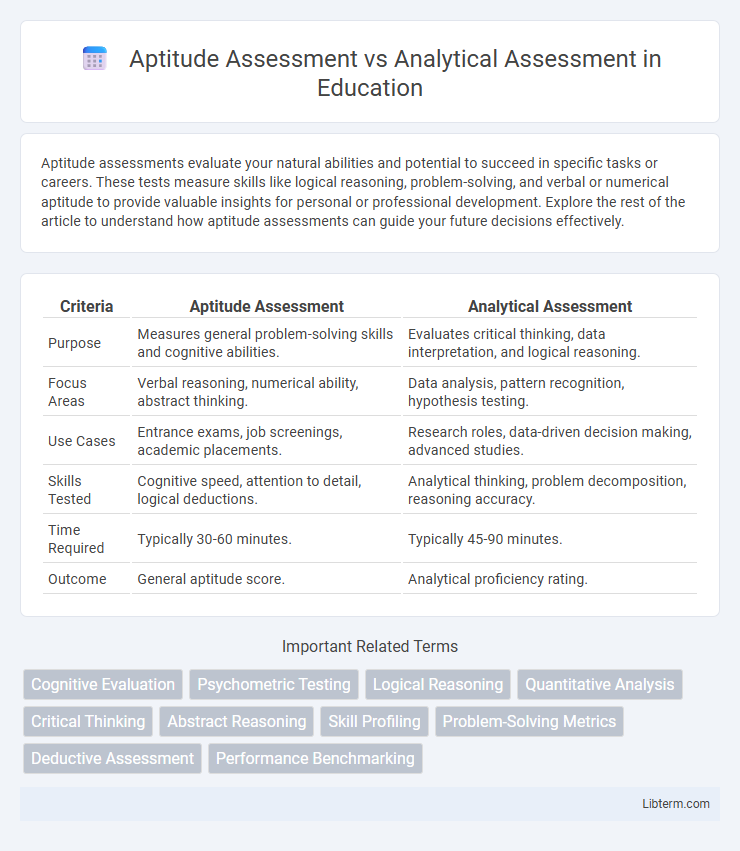Aptitude assessments evaluate your natural abilities and potential to succeed in specific tasks or careers. These tests measure skills like logical reasoning, problem-solving, and verbal or numerical aptitude to provide valuable insights for personal or professional development. Explore the rest of the article to understand how aptitude assessments can guide your future decisions effectively.
Table of Comparison
| Criteria | Aptitude Assessment | Analytical Assessment |
|---|---|---|
| Purpose | Measures general problem-solving skills and cognitive abilities. | Evaluates critical thinking, data interpretation, and logical reasoning. |
| Focus Areas | Verbal reasoning, numerical ability, abstract thinking. | Data analysis, pattern recognition, hypothesis testing. |
| Use Cases | Entrance exams, job screenings, academic placements. | Research roles, data-driven decision making, advanced studies. |
| Skills Tested | Cognitive speed, attention to detail, logical deductions. | Analytical thinking, problem decomposition, reasoning accuracy. |
| Time Required | Typically 30-60 minutes. | Typically 45-90 minutes. |
| Outcome | General aptitude score. | Analytical proficiency rating. |
Introduction to Aptitude and Analytical Assessments
Aptitude assessments measure inherent abilities such as logical reasoning, numerical skills, and verbal proficiency, providing insight into a candidate's potential for learning and problem-solving. Analytical assessments focus on evaluating critical thinking, data interpretation, and decision-making skills through complex problem scenarios. Both assessments are essential tools in recruitment and educational settings to predict performance and capability accurately.
Defining Aptitude Assessment
Aptitude Assessment measures a candidate's innate ability to learn, reason, and solve problems across various domains, often including numerical, verbal, and spatial reasoning. This type of assessment evaluates potential rather than acquired knowledge, providing insights into future job performance and cognitive flexibility. Analytical Assessment, by contrast, focuses specifically on evaluating critical thinking, data interpretation, and problem-solving skills related to analyzing complex information.
Defining Analytical Assessment
Analytical assessment measures the ability to logically evaluate information, solve complex problems, and interpret data patterns, often through tasks involving critical thinking, reasoning, and data analysis. Aptitude assessment broadly evaluates a candidate's innate potential across various domains, including verbal, numerical, and spatial abilities. Defining analytical assessment specifically, it centers on cognitive skills essential for decision-making and strategic problem-solving in data-driven environments.
Key Differences Between Aptitude and Analytical Assessments
Aptitude assessments measure innate abilities such as numerical, verbal, and logical reasoning, designed to predict a candidate's potential to learn and perform tasks. Analytical assessments focus specifically on problem-solving skills, critical thinking, and the ability to evaluate complex information and draw conclusions. The key difference lies in aptitude tests assessing broad cognitive abilities, while analytical tests target specialized evaluation of data interpretation and decision-making skills.
Core Skills Measured in Aptitude Assessments
Aptitude assessments primarily measure core skills such as logical reasoning, numerical ability, verbal comprehension, and problem-solving, which are crucial for evaluating a candidate's potential to learn and perform tasks efficiently. In contrast, analytical assessments emphasize data interpretation, critical thinking, and the ability to analyze complex situations or datasets to make informed decisions. Aptitude assessments provide a broad evaluation of foundational cognitive abilities, making them essential for predicting job performance and learning aptitude.
Core Skills Measured in Analytical Assessments
Analytical assessments primarily measure core skills such as critical thinking, logical reasoning, data interpretation, and problem-solving abilities. These tests evaluate how candidates analyze patterns, draw conclusions from complex information, and make decisions based on quantitative and qualitative data. Unlike general aptitude assessments, analytical assessments focus deeply on evaluating reasoning accuracy and the ability to synthesize information effectively.
Relevance in Recruitment and Education
Aptitude assessments evaluate general cognitive abilities such as reasoning, problem-solving, and comprehension, making them essential for screening candidates in recruitment and identifying students' potential in education. Analytical assessments focus on domain-specific skills like data analysis, critical thinking, and decision-making, which are crucial for roles requiring specialized expertise and advanced academic performance. Selecting the appropriate assessment type enhances talent identification accuracy, aligning candidate capabilities with job requirements and educational goals.
Advantages of Aptitude Assessments
Aptitude assessments efficiently measure innate abilities like reasoning, problem-solving, and cognitive potential, providing a broad understanding of a candidate's capabilities beyond acquired knowledge. These tests are quick to administer and score, making them ideal for large-scale recruitment and talent identification. Unlike analytical assessments that focus narrowly on specific skill sets, aptitude assessments offer a predictive insight into future performance and learning capacity across diverse roles.
Advantages of Analytical Assessments
Analytical assessments offer precise evaluation of critical thinking, problem-solving, and data interpretation skills, making them ideal for roles requiring cognitive complexity. They provide actionable insights into a candidate's ability to analyze information and make informed decisions under pressure. This targeted measurement improves hiring accuracy and predicts job performance more effectively than general aptitude tests.
Choosing the Right Assessment for Your Needs
Selecting the right assessment depends on your goal: aptitude assessments measure general cognitive abilities like problem-solving, logical reasoning, and verbal skills, while analytical assessments focus on specific skills such as data interpretation, critical thinking, and quantitative analysis. Aptitude tests are ideal for evaluating overall potential and adaptability in diverse roles, whereas analytical assessments are better suited for positions requiring strong domain-specific analytical capabilities. Understanding the job requirements and desired skill sets ensures the chosen assessment aligns with organizational objectives and candidate evaluation criteria.
Aptitude Assessment Infographic

 libterm.com
libterm.com